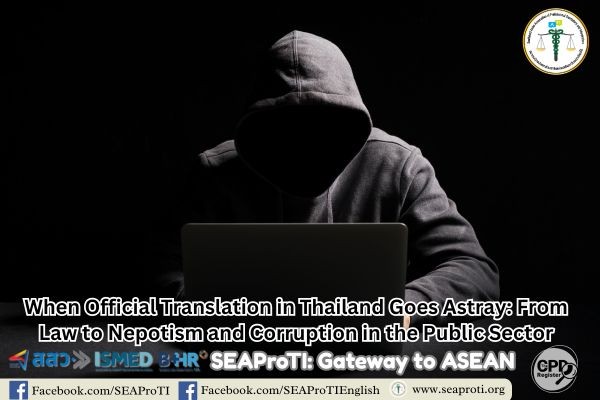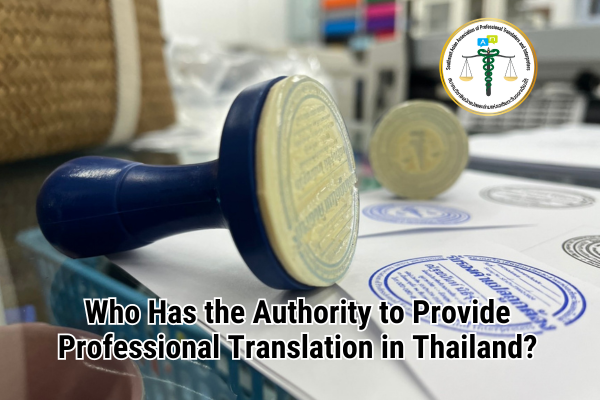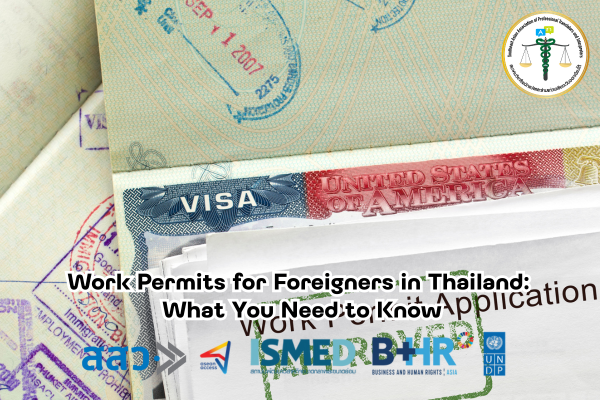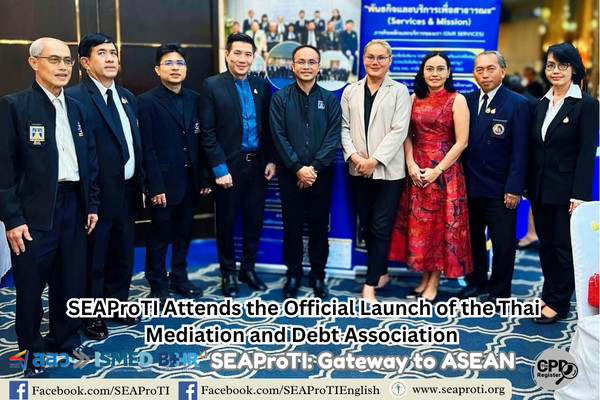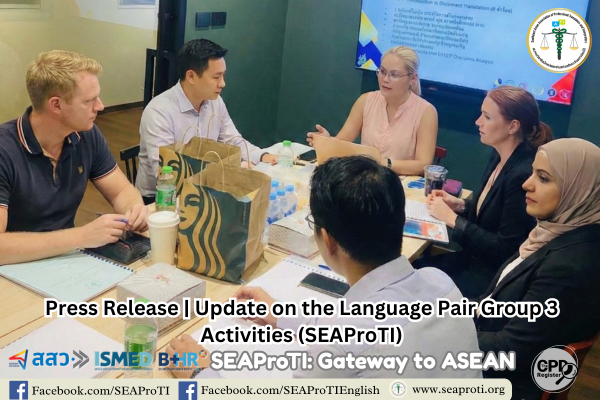When Official Translation in Thailand Goes Astray: From Law to Nepotism and Corruption in the Public Sector
19 October 2025, Bangkok – This article examines the systemic problems surrounding the translation of official documents in Thailand, highlighting the lack of good governance, transparency, and professional regulation. Nepotistic recruitment, monopolized assignments, and fraudulent practices—collectively known as scams in translation—have undermined both the quality and credibility of government-issued translations. The article argues for institutional reform that centers on an independent translator accreditation system, stronger accountability mechanisms, and the adoption of international standards in public-sector translation practices.
1. Introduction
Under Thai law, the administration of the state must be guided by the principles of transparency, accountability, and efficiency, as mandated by the Public Administration Act B.E. 2534 (1991) and Section 77 of the Constitution of the Kingdom of Thailand (2017).
However, in practice, the translation of official documents—a crucial process for inter-agency communication, international cooperation, and legal proceedings—has often been neglected. Instead of emphasizing professional merit and legal integrity, translation assignments in many government offices are influenced by personal connections, favoritism, or hidden benefit networks, leading to inefficiency and corruption.
2. Nepotism and the Erosion of Professional Standards
The selection of translators for official work in Thailand often depends more on personal ties than on professional qualifications or linguistic competence. This practice violates both ethical and legal standards of fair public administration (Office of the Public Sector Development Commission, 2023).
Consequently, official translations—including court judgments, international agreements, and intergovernmental contracts—are frequently handled by unqualified individuals or firms, resulting in inaccurate or misleading translations. Such errors have caused legal misinterpretations, diplomatic misunderstandings, and reputational damage to Thailand in international contexts.
3. Corruption and Scams in the Translation Industry
3.1 Forms of Fraud and Deception
Recent years have witnessed a growing number of translation-related scams in Thailand’s administrative ecosystem, including:
- Forgery of translation certificates bearing fake government seals or association logos;
- Unauthorized use of “certified translator” titles without actual credentials;
- Brokerage fraud, where intermediaries collect inflated translation fees and exploit subcontracted translators;
- Unlawful certification by lawyers, who, despite lacking linguistic qualifications, issue “certifications” for translations they did not perform.
These scams expose the absence of a coherent regulatory framework in the Thai translation industry, where neither government agencies nor professional bodies have sufficient authority or coordination to monitor malpractice (SEAProTI, 2024).
3.2 Legal and Diplomatic Consequences
A frequent public misunderstanding concerns document legalization by the Department of Consular Affairs, Ministry of Foreign Affairs.
- The Department only verifies the authenticity of signatures and official seals,
- not the accuracy or content of the translation itself (Department of Consular Affairs, 2023).
As a result, documents that are “consularly legalized” in Thailand may not be accepted abroad unless the translation is performed and certified by a translator recognized by the destination country’s standards—such as those accredited by NAATI (Australia), CIOL (UK), or ATA (USA).
4. Reform and Regulatory Recommendations
4.1 Establishing an Independent Translator Accreditation System
Thailand urgently needs an independent and legally recognized translator certification mechanism, ideally under or in collaboration with SEAProTI, modeled after international systems such as the National Register of Public Service Interpreters (NRPSI) in the UK or NAATI in Australia.
Such a body would:
- Conduct standardized qualification exams;
- Issue renewable professional licenses;
- Maintain a public registry of certified translators for government use;
- Enforce disciplinary measures against misconduct.
4.2 Quality Assurance and Accountability
A robust quality control framework should include peer review, back translation auditing, and a formal complaint mechanism. Translators must assume personal responsibility for their certified translations, and violations should be subject to administrative or professional penalties.
4.3 Collaboration Between State and Profession
Sustainable reform requires cooperation among government agencies, professional associations, and academic institutions to harmonize translation standards, promote ethical conduct, and enhance Thailand’s international credibility.
5. Conclusion
The translation of official documents is not merely a linguistic activity but a matter of state integrity and justice. When nepotism and corruption infiltrate the translation process, both legal certainty and national credibility suffer. Restoring public trust demands a transparent, merit-based, and internationally aligned translation system—one that recognizes certified translators as legal professionals essential to the rule of law and fair administration.
References
Department of Consular Affairs, Ministry of Foreign Affairs. (2023). Guidelines on certified translation and legalization of documents. Bangkok: MFA Thailand.
National Accreditation Authority for Translators and Interpreters (NAATI). (2023). Certification System Overview. Canberra: NAATI.
National Register of Public Service Interpreters (NRPSI). (2024). Standards and Code of Conduct. London: NRPSI.
Office of the Public Sector Development Commission. (2023). Good governance in public administration. Bangkok: OCSC.
SEAProTI. (2024). Professional standards and certification framework for translators and interpreters in Southeast Asia. Bangkok: Southeast Asian Association of Professional Translators and Interpreters.
About Certified Translators, Translation Certifiers, and Certified Interpreters of SEAProTI
The Southeast Asian Association of Professional Translators and Interpreters (SEAProTI) has formally announced the qualifications and requirements for registration of Certified Translators, Translation Certification Providers, and Certified Interpreters in Sections 9 and 10 of the Royal Gazette, published by the Secretariat of the Cabinet, Office of the Prime Minister of Thailand, on 25 July 2024 (Vol. 141, Part 66 Ng, p. 100). Certified Translators, Translation Certification Providers, and Certified Interpreters
The Council of State has proposed the enactment of a Royal Decree, granting registered translators and recognized translation certifiers from professional associations or accredited language institutions the authority to provide legally valid translation certification (Letter to SEAProTI dated April 28, 2025)
SEAProTI is the first professional association in Thailand and Southeast Asia to implement a comprehensive certification system for translators, certifiers, and interpreters.
Head Office: Baan Ratchakru Building, No. 33, Room 402, Soi Phahonyothin 5, Phahonyothin Road, Phaya Thai District, Bangkok 10400, Thailand
Email: hello@seaproti.com | Tel.: (+66) 2-114-3128 (Office hours: Mon–Fri, 09:00–17:00)
เมื่อการแปลเอกสารราชการไทยหลงทาง: จากกฎหมายสู่ระบบพวกพ้อง และคอรัปชันในแวดวงราชการไทย
19 ตุลาคม 2568, กรุงเทพมหานคร – บทความนี้วิเคราะห์ปัญหาเชิงโครงสร้างของระบบการแปลเอกสารราชการในประเทศไทย ซึ่งสะท้อนถึงการขาดหลักธรรมาภิบาล ความโปร่งใส และการกำกับดูแลที่มีประสิทธิภาพ การคัดเลือกนักแปลตามระบบพวกพ้อง การผูกขาดการรับงาน และการฉ้อโกงในรูปแบบต่าง ๆ (“scams in translation”) ส่งผลให้คุณภาพของเอกสารแปลที่มีผลทางกฎหมายลดลง บทความนี้เสนอแนวทางการปฏิรูปโดยเน้นการสร้างระบบรับรองนักแปลอิสระ และการบังคับใช้มาตรฐานสากลในวงราชการไทย
1. บทนำ
ในทางกฎหมายไทย การบริหารงานของรัฐต้องตั้งอยู่บนหลักความโปร่งใส ตรวจสอบได้ และมีประสิทธิภาพ ตาม พระราชบัญญัติว่าด้วยการบริหารงานของรัฐ พ.ศ. 2534 และ รัฐธรรมนูญแห่งราชอาณาจักรไทย มาตรา 77 อย่างไรก็ตาม ในทางปฏิบัติ “งานแปลเอกสารราชการ” ซึ่งเป็นกระบวนการสำคัญในการติดต่อกับหน่วยงานภายในและต่างประเทศ กลับถูกละเลยในแง่ของมาตรฐานอาชีพ และกลายเป็นพื้นที่ที่เปิดโอกาสให้ระบบพวกพ้องและการทุจริตแทรกซึมอยู่ในหลายระดับ
2. ปัญหาความไม่โปร่งใสและระบบพวกพ้อง
การแต่งตั้งหรือมอบหมายงานแปลในหน่วยงานรัฐหลายแห่งยังคงอาศัยความสัมพันธ์ส่วนบุคคลมากกว่าคุณสมบัติทางวิชาชีพ ส่งผลให้เกิดการเลือกนักแปลหรือบริษัทแปลที่ไม่มีใบอนุญาต หรือขาดคุณวุฒิทางภาษาและกฎหมาย การกระทำเช่นนี้ไม่เพียงละเมิดหลักจรรยาบรรณ แต่ยังขัดต่อหลักธรรมาภิบาลของรัฐ (Office of the Public Sector Development Commission, 2023)
ผลลัพธ์คือ เอกสารราชการที่ถูกแปลอย่างผิดพลาดหรือคลาดเคลื่อนทางกฎหมาย เช่น คำพิพากษา ข้อตกลงระหว่างประเทศ หรือสัญญาระหว่างหน่วยงานภาครัฐกับเอกชนต่างชาติ ซึ่งอาจก่อให้เกิดความเสียหายทั้งในด้านเศรษฐกิจและชื่อเสียงของประเทศ
3. คอรัปชันและการฉ้อโกงในวงการแปล (“Scams in Translation”)
3.1 การฉ้อโกงรูปแบบใหม่
ในช่วงไม่กี่ปีที่ผ่านมา วงการแปลเอกสารราชการไทยประสบปัญหา “การฉ้อโกงและหลอกลวง” (translation scams) เช่น
- การปลอมใบรับรองการแปล โดยใช้ชื่อสมาคมหรือหน่วยงานรัฐปลอม
- การใช้ชื่อ “นักแปลรับรอง” โดยไม่มีใบอนุญาตจริง
- การว่าจ้างผ่านตัวกลางที่เก็บค่าบริการเกินจริง โดยไม่ส่งต่อค่าตอบแทนที่เป็นธรรมให้ผู้แปล
- การรับรองเอกสารเท็จ โดยผู้ไม่มีสิทธิ เช่น ทนายความที่รับรองการแปลแทนนักแปล (ซึ่งผิดหลักวิชาชีพโดยสิ้นเชิง)
กรณีเหล่านี้สะท้อนช่องว่างของระบบกำกับดูแลที่ยังไม่เป็นเอกภาพ ทั้งจากฝั่งหน่วยงานรัฐและผู้ประกอบวิชาชีพ (SEAProTI, 2024)
3.2 ผลกระทบทางกฎหมายและภาพลักษณ์
เอกสารที่ถูกแปลโดยบุคคลหรือหน่วยงานที่ไม่มีอำนาจรับรอง อาจไม่เป็นที่ยอมรับในต่างประเทศ แม้จะผ่านการรับรองจาก กรมการกงสุล กระทรวงการต่างประเทศ แล้วก็ตาม เนื่องจากการรับรองของกรมการกงสุลเป็นเพียง “การยืนยันลายมือชื่อของผู้แปล” ไม่ใช่การรับรองความถูกต้องของเนื้อหา (Department of Consular Affairs, 2023)
ดังนั้น ก่อนการใช้เอกสารในต่างประเทศ ผู้ขอแปลควรสอบถามหน่วยงานปลายทางเสมอว่าต้องการให้ใครเป็นผู้รับรองการแปล — เช่น นักแปลที่ได้รับการรับรองจากสมาคมวิชาชีพต่างประเทศ (เช่น NAATI, CIOL, หรือ ATA)
4. แนวทางการปฏิรูปและการกำกับวิชาชีพ
4.1 การจัดตั้งระบบรับรองนักแปลอิสระ
ประเทศไทยควรมีระบบรับรองนักแปลอย่างเป็นทางการ โดยอาจอยู่ภายใต้การกำกับของ สมาคมวิชาชีพนักแปลและล่ามแห่งเอเชียตะวันออกเฉียงใต้ (SEAProTI) หรือคณะกรรมการอิสระในลักษณะเดียวกับ NRPSI (UK) หรือ NAATI (Australia) เพื่อกำหนดมาตรฐานขั้นต่ำในการปฏิบัติงาน การสอบคุณวุฒิ และการต่ออายุใบอนุญาต
4.2 การเสริมกลไกตรวจสอบและบทลงโทษ
จำเป็นต้องมีกลไกตรวจสอบคุณภาพงานแปลอย่างเป็นระบบ เช่น การตรวจสอบซ้ำ (peer review) และการตรวจสอบย้อนหลัง (audit) พร้อมบทลงโทษทางวินัยสำหรับผู้ฝ่าฝืน เช่น การพักหรือเพิกถอนใบอนุญาต เพื่อยกระดับความน่าเชื่อถือของระบบโดยรวม
4.3 การสร้างความร่วมมือระหว่างรัฐและวิชาชีพ
การปฏิรูประบบแปลราชการควรเป็นความร่วมมือระหว่างภาครัฐ ภาควิชาชีพ และสถาบันการศึกษา เพื่อให้เกิดการพัฒนาอย่างยั่งยืนในด้านคุณภาพ ความโปร่งใส และการยอมรับในระดับนานาชาติ
5. บทสรุป
“การแปลเอกสารราชการ” เป็นหัวใจของความน่าเชื่อถือทางกฎหมายและการทูตของประเทศ แต่เมื่อระบบเต็มไปด้วยความไม่โปร่งใสและคอรัปชัน ความเสี่ยงทางกฎหมายย่อมตกอยู่กับทั้งรัฐและประชาชน การสร้างระบบรับรองที่โปร่งใส มีมาตรฐาน และตรวจสอบได้ คือเส้นทางเดียวที่จะฟื้นฟูศรัทธาต่อวงการแปลราชการไทยในระยะยาว
บรรณานุกรม (References)
- Department of Consular Affairs, Ministry of Foreign Affairs. (2023). Guidelines on certified translation and legalization of documents. Bangkok: MFA Thailand.
- Office of the Public Sector Development Commission. (2023). Good governance in public administration. Bangkok: OCSC.
- SEAProTI. (2024). Professional standards and certification framework for translators and interpreters in Southeast Asia. Bangkok: Southeast Asian Association of Professional Translators and Interpreters.
- National Register of Public Service Interpreters (NRPSI). (2024). Standards and Code of Conduct. London: NRPSI.
- National Accreditation Authority for Translators and Interpreters (NAATI). (2023). Certification System Overview. Canberra: NAATI.
เกี่ยวกับนักแปลรับรอง ผู้รับรองการแปล และล่ามรับรองของสมาคมวิชาชีพนักแปลและล่ามแห่งเอเชียตะวันออกเฉียงใต้
สมาคมวิชาชีพนักแปลและล่ามแห่งเอเชียตะวันออกเฉียงใต้ (SEAProTI) ได้ประกาศหลักเกณฑ์และคุณสมบัติผู้ที่ขึ้นทะเบียนเป็น “นักแปลรับรอง (Certified Translators) และผู้รับรองการแปล (Translation Certification Providers) และล่ามรับรอง (Certified Interpreters)” ของสมาคม หมวดที่ 9 และหมวดที่ 10 ในราชกิจจานุเบกษา ของสำนักเลขาธิการคณะรัฐมนตรี ในสำนักนายกรัฐมนตรี แห่งราชอาณาจักรไทย ลงวันที่ 25 ก.ค. 2567 เล่มที่ 141 ตอนที่ 66 ง หน้า 100 อ่านฉบับเต็มได้ที่: นักแปลรับรอง ผู้รับรองการแปล และล่ามรับรอง
สำนักคณะกรรมการกฤษฎีกาเสนอให้ตราเป็นพระราชกฤษฎีกา โดยกำหนดให้นักแปลที่ขึ้นทะเบียน รวมถึงผู้รับรองการแปลจากสมาคมวิชาชีพหรือสถาบันสอนภาษาที่มีการอบรมและขึ้นทะเบียน สามารถรับรองคำแปลได้ (จดหมายถึงสมาคม SEAProTI ลงวันที่ 28 เม.ย. 2568)
สมาคมวิชาชีพนักแปลและล่ามแห่งเอเชียตะวันออกเฉียงใต้ เป็นสมาคมวิชาชีพแห่งแรกในประเทศไทยและภูมิภาคเอเชียตะวันออกเฉียงใต้ที่มีระบบรับรองนักแปลรับรอง ผู้รับรองการแปล และล่ามรับรอง
สำนักงานใหญ่: อาคารบ้านราชครู เลขที่ 33 ห้อง 402 ซอยพหลโยธิน 5 ถนนพหลโยธิน แขวงพญาไท เขตพญาไท กรุงเทพมหานคร 10400 ประเทศไทย
อีเมล: hello@seaproti.com โทรศัพท์: (+66) 2-114-3128 (เวลาทำการ: วันจันทร์–วันศุกร์ เวลา 09.00–17.00 น.)


